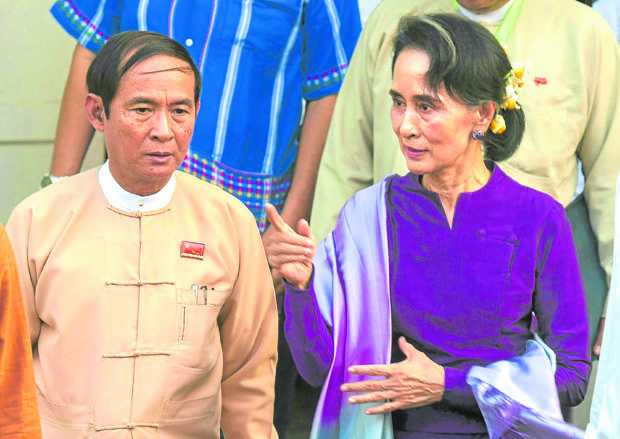
DETAINED LEADERS In this photo taken on March 14, 2016, Myanmar State Counselor Aung San Suu Kyi (right) is accompanied by President Win Myint, then the Lower House speaker, after a meeting of National League for Democracy members of parliament in Naypyidaw. The Myanmar military has detained the country’s top civilian leaders, including Suu Kyi and Win Myint, following a coup on Monday. —AFP
The United Nations led condemnation of Myanmar’s military on Monday after it seized power, calling for the release of elected leaders, including Nobel laureate Aung San Suu Kyi. UN Secretary General Antonio Guterres said the developments were a “serious blow to democratic reforms” and urged all leaders to refrain from violence and respect human rights, a UN spokesperson said. Myanmar’s military staged a coup on Monday, detaining democratically elected leader Suu Kyi and declaring it had taken control of the country for one year under a state of emergency.
Call to protest
The National League for Democracy (NLD) party said Suu Kyi called on the public not to accept a coup by the military and urged them to protest.
“The actions of the military are actions to put the country back under a dictatorship,” the NLD said in a statement that carried Suu Kyi’s name. “I urge people not to accept this, to respond and wholeheartedly to protest against the coup by the military.”
The United States, Australia and Singapore expressed dismay at the military’s declaration of a state of emergency and the detentions, which the army said it had carried out in response to “election fraud.”
“We call on Burmese military leaders to release all government officials and civil society leaders and respect the will of the people of Burma as expressed in democratic elections on Nov. 8,” US Secretary of State Antony Blinken said in a statement, referring to Myanmar by its old name.
The White House said US President Joe Biden had been briefed on the detentions.
“The United States opposes any attempt to alter the outcome of recent elections or impede Myanmar’s democratic transition and will take action against those responsible if these steps are not reversed,” White House spokesperson Jen Psaki said.
Australian Foreign Minister Marise Payne called on the military “to respect the rule of law, to resolve disputes through lawful mechanisms and to release immediately all civilian leaders and others” who had been detained.
State of emergency
Singapore’s Foreign Ministry urged all parties to exercise restraint and work toward a positive and peaceful outcome.
The detentions came after days of escalating tension between the civilian government and the military after the
Nov. 8 election in which Suu Kyi’s party, the NLD, scored a landslide win.
The army on Monday handed power to military chief Min Aung Hlaing and imposed a state of emergency for one year, according to a statement on a military-owned television station. (See related story on this page.)
It justified the coup by alleging “huge irregularities” in the November polls that the election commission had failed to deal with.
“As the situation must be resolved according to the law, a state of emergency is declared,” the announcement said.
The military moved quickly to stifle dissent, severely restricting the internet and mobile phone communications across the country.
In Yangon, the former capital that remains Myanmar’s commercial hub, troops seized the city hall just ahead of the announcement, according to an Agence France-Presse (AFP) journalist.
Elsewhere, the chief minister of Karen state and several other regional ministers were also held, NLD sources told AFP.
Detained
Suu Kyi and President Win Myint were detained in the capital, Naypyidaw, before dawn, NLD spokesperson Myo Nyunt told AFP, just hours before parliament was meant to reconvene for the first time since the elections.
Myanmar’s polls in November were only the second democratic elections the country had seen since it emerged from the 49-year grip of military rule in 2011.
The NLD swept the polls and was expecting to renew the 75-year-old Suu Kyi’s lease on power with a new five-year term.
ACTING PRESIDENT A screen grab from a Myanmar state television footage broadcast on Monday shows acting President Myint Swe (right) reading a statement, as Senior General Min Aung Hlaing looks on. —REUTERS
Suu Kyi is an immensely popular figure in Myanmar for her opposition to the military, having spent the best part of two decades under house arrest during the previous dictatorship.
But the military has for weeks complained the polls were riddled with irregularities, and claimed to have uncovered more than 10 million instances of voter fraud.
It had demanded the government-run election commission to release voter lists for cross-checking—which the commission did not do.
Last week, Min Aung Hlaing—arguably the country’s most powerful individual—said Myanmar’s 2008 constitution could be “revoked” under certain circumstances.
Myanmar has seen two previous coups since independence from Britain in 1948, one in 1962 and another in 1988.
Suu Kyi’s previous opposition to the military earned her the Nobel Peace Prize.
Rohingya crackdown
But her international image was shredded during her time in power as she defended the military-backed crackdown in 2017 against the country’s Muslim Rohingya community.
About 750,000 Rohingya were forced to flee into neighboring Bangladesh during the campaign, which UN investigators said amounted to genocide.
Suu Kyi was only de facto leader of Myanmar as the military had inserted a clause in the constitution that barred her from being president. But to circumvent the clause, Suu Kyi assumed leadership of the country via a new role of “state counselor.” —REPORTS FROM REUTERS AND AFP